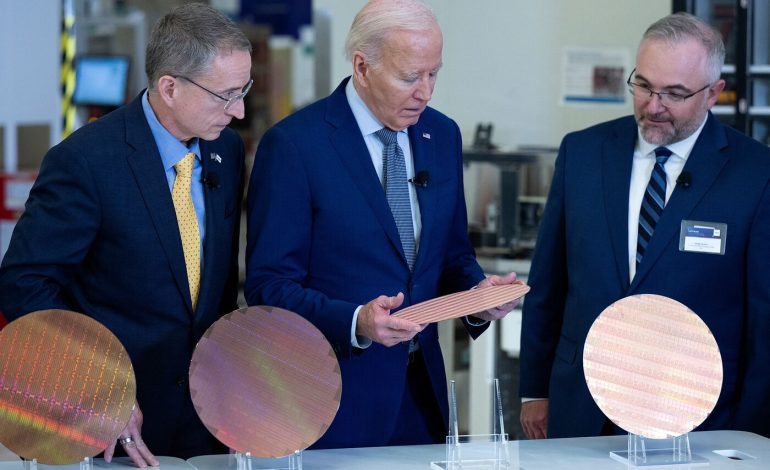Intel Corporation, once a cornerstone of the Biden administration’s ambitious plan to revitalize domestic semiconductor manufacturing, is facing significant financial difficulties that are jeopardizing its role in the US chipmaking renaissance, Bloomberg reports.
The Biden-Harris administration has heavily invested in Intel as a key player in its strategy to secure a reliable supply of cutting-edge chips for national security purposes and to position the US as a leader in global semiconductor production. In March, President Biden announced a potential $20 billion package of incentives for Intel, contingent on the company meeting certain milestones. However, five months later, Intel has yet to receive any of the $8.5 billion in grants and $11 billion in loans promised under the 2022 Chips and Science Act, as the company’s financial troubles raise doubts about its ability to deliver on its commitments.
Intel’s recent struggles, which include a significant earnings miss and a sharp decline in its stock price, have prompted its board to consider drastic measures, such as splitting off its manufacturing division or scaling back its global factory plans. These actions could further delay or reduce the company’s eligibility for government subsidies, complicating the Biden administration’s efforts to achieve its semiconductor policy goals.
The company’s financial woes are not only a concern for Intel but also for the broader US semiconductor strategy. Intel’s factory expansion plans, which include projects in Arizona, New Mexico, Ohio, and Oregon, are crucial to the Chips Act’s success. The act aims to boost domestic manufacturing of critical electronic components, with a particular focus on advanced processors for the Pentagon. However, market conditions and Intel’s internal challenges could force the company to lower its ambitions, potentially reducing the scope of its subsidy package.
Moreover, Intel’s ability to attract new business remains uncertain. While the company has discussed potential partnerships with firms like Broadcom, MediaTek, and Microsoft, none of these deals have materialized into full-scale production. This has raised concerns among industry officials and investors about Intel’s competitiveness in the global chip market, especially compared to leaders like Taiwan Semiconductor Manufacturing Co. (TSMC) and Samsung Electronics.
The Biden administration remains optimistic about the overall success of the Chips Act, which has already spurred $400 billion in announced investments from industry leaders. However, Intel’s struggles highlight the risks inherent in this public-private partnership and the challenges of revitalizing an industry as complex and cyclical as semiconductor manufacturing.









